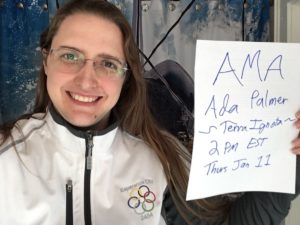From Ada’s AMA: Life

On January 11th 2018, Ada did an “Ask Me Anything” on Reddit, and I’m extracting the most interesting questions and answers and preserving them here. The ones in this post are about life, work, work-life balance, imposter syndrome etc.
A Space-X engineer: I’ve been at SpaceX for about two years now. My actual, real-life experience since graduating school has been voking 50-60 hours a week for the Great Project. I don’t really have a question; I just wanted to say thank you, thank you so much for the Utopians, and for the world that created them <3
Ada: Thank you. A friend mentioned to me that he’d seen a SpaceX engineer post online with great enthusiasm for Terra Ignota, and I was so happy it made me bounce in my chair and tear up. The Great Project is a profound act of love giving such a gift to the future, and also a profound act of teamwork with so many parts. For some of us the challenge is that our contributions feel so distant, that (as my song Somebody Will says) we are contributing to the civilizational path to the stars but at such a distance that the connection between our efforts–running a store, marketing a device, standing in a classroom–can be dishearteningly invisible. But at the same time I know that friends on the other face have a different kind of disheartening experience, the slowness of it all, as you work on improving rockets, or mapping Mars, understanding fully how huge the task is, how long, how certain it is that what we’re working for is not for our generation. So thank you so much for keeping at it, that wonderful, invaluable, difficult work, and also thank you for telling me you found Utopia and Terra Ignota so powerful. A world where the project and its interconnections are no longer invisible. A world where we, and the fact that we are a we, is no longer invisible.
logomaniac reviews: As someone with a literary bent entering academia, I’m interested in how you balance your careers day to day. I imagine it’s a lot of writing, for one. And it’s clear that your research influences your fiction – in what ways does the influence go the other way (has your fiction work changed the way you teach/write for academia)?
Ada: Career balance is really hard and I’m really struggling to balance academic obligations with writing time with disability, but I feel I’m getting better at it all the time (the Utopian oath printed on my desk helps!  So does taking lots of breaks to rest and mentally refresh by watching anime or playing Pandemic Legacy with friends). The history work absolutely transformed how I think about the change and development of worlds over time and is a huge part of how I world build, the questions I ask about how institutions got to be the way they would be. I’m so incredibly fortunate to be at a university where colleagues are supportive of my fiction and don’t see it as taking time away from my other work.
So does taking lots of breaks to rest and mentally refresh by watching anime or playing Pandemic Legacy with friends). The history work absolutely transformed how I think about the change and development of worlds over time and is a huge part of how I world build, the questions I ask about how institutions got to be the way they would be. I’m so incredibly fortunate to be at a university where colleagues are supportive of my fiction and don’t see it as taking time away from my other work.
Logomaniac: What’s your favorite course you’ve ever taken or taught?
Favorite course Alan Kors’ intro to the Enlightenment, which is now immortal on DVD so you can enjoy it too!
Logomaniac: I’d also love to hear a little more about your project on censorship throughout history, what inspired you to do that, what your goals are, etc.
Ada: On Censorship I just managed to upload these videos of my GoH talk at Chessiecon where I talk about it. Very exciting!
 Injygo: You’re the Ur-Fan, the Alpha Nerd, filker, historian, novelist, and sff fan. Can it be that you, like us mere mortals, have been frustrated or demotivated? How have you managed to become as cool as you are, and do you have advice for aspiring Alpha Nerds?
Injygo: You’re the Ur-Fan, the Alpha Nerd, filker, historian, novelist, and sff fan. Can it be that you, like us mere mortals, have been frustrated or demotivated? How have you managed to become as cool as you are, and do you have advice for aspiring Alpha Nerds?
Ada: Yes, I absolutely struggle with frustration, demoralization, impostor syndrome, all of it. I talk about it a bit in my author’s note at he end of “Too Like the Lightning” and also in my blog post about how I sold it: (also has a lot of my advice, the big one being to keep doing and making and writing more and more things, not getting stuck on one attempt)
A lot of people don’t believe I could feel impostor syndrome with how much success I’ve had, but I absolutely do, despite the books’ success, despite awards, despite getting tenure here at the University of Chicago. But impostor syndrome isn’t rational so it doesn’t go away no matter how much counter-evidence you have. It still stuns me sometimes how one negative from someone who doesn’t like the novels can make me gloomy for days even if there are fifty sparklingly positive ones in the same time. So one big piece of advice is to remember that everyone struggles with motivation and frustration, and that struggling with it doesn’t mean there’s something wrong with you.
I also self-monitor very carefully, which helps a lot. There is a history of depression in my family so from early childhood I learned about it and learned to watch myself carefully for symptoms, to talk to friends about it and ask them to keep an eye out, etc. I learned to observe my mood and listen to my body, to notice what small environmental changes can help me concentrate better, work better, feel better (I concentrate better when slightly chilly, for example, which is why I usually wear sleeveless shirts , and I feel happier when I exercise semi-regularly and when I’ve washed my hair recently. Why? Who knows, but now that I know that I can use it to keep my spirits up.) Fortunately I’ve never had bad depression the way my family has, despite being at great risk and extra risk because chronic pain, which I do have, so often brings depression with it. But I think learning about it young and watching myself carefully, and surrounding myself with supportive friends, has done wonders for giving me healthy work habits. I make sure to have meals with friends often, to take breaks for board games or interactive fun often (studies show that interactive fun like a conversation or watching a show together is more emotionally restorative than passive fun like vegging out with the TV). It’s not for nothing that the Utopian oath mentions taking the rest and leisure you need to be your most productive, which can be a lot! The oath really means that working is your default, rest/play your mandatory assignment, rather than the other way around.
This got rather rambly, sorry. But above all I recommend going forward and doing and making and writing more and more, always having a next project in mind, never stopping to dwell on one. As Jo put it in her poem “Go away and be more awesome.”
2 Responses to “From Ada’s AMA: Life”
-
FYI: the youtube link is broken
In other news, anxiously awaiting the conclusion of Terra Ignota. (and anything else coming down the pike!) -
For the censorship talk, go here: https://www.youtube.com/results?search_query=Censorship+Chessiecon


